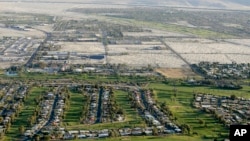California is coping with one of its most serious droughts in decades. The snow pack in the Sierra Mountains, which provides 30 percent of the state's water in normal years, stands at record-low levels, and California Governor Jerry Brown has implemented the state's strictest-ever conservation measures.
Scientists and officials meeting near Los Angeles said a worst-case scenario - a mega-drought - is possible but unlikely.
In early April, the Sierra Mountains snow pack was at its lowever recorded level - just 5 percent of normal.
Snow pack
State climatologist Michael Anderson said the snow should be melting now and flowing to reservoirs, peaking in early May and continuing into July.
“This year, with almost no snow there, there really is very little stream flow picking up. There won't be any noticeable peak in it. Tailing off will occur earlier. There will probably be parts of the Sierra that will go dry," Anderson said.
The state must rely on water stored in reservoirs or pumped from underground. Groundwater is now the source of water for farmers in California's Central Valley, and scientists said the aquifers there are being depleted.
Scientists and officials are sharing climate data at a three-day conference that ends Wednesday at the University of California, Irvine.
They said in addition to scanty rainfall, the state is coping with higher temperatures, which have reduced snowfall in the mountains and increased the runoff from infrequent rain storms.
Martin Hoerling of the U.S. National Oceanographic and Atmospheric Administration said droughts are cyclical, but temperatures are also 1 degree Celsius warmer that usual.
“It's been [even] warmer than that the last couple of years. It's probably been at least three, maybe 4 degrees Celsius, warmer than average, especially in the spring and summer," Hoerling said.
The record preserved in the rings of tree trunks shows that 1,000 years ago, California experienced a so-called mega-drought that lasted decades.
The state is now in its fourth year of drought, but water management expert Jay Lund of the University of California, Davis said a drought of four or five years is not so unusual.
'I think we'll survive this one'
“We've survived similar droughts in the past. I think we'll survive this one, although we will certainly suffer in the meantime, particularly agricultural water users and some of the native species ecosystems," Lund said.
He said he believes the state could adapt to a longer drought, if it had to.
Jeanine Jones of the California Department of Water Resources said state officials are responding.
“Improving water conservation, improving groundwater management, encouraging local agencies to implement integrated regional water management so they can build together on a regional scale to improve their water supply," Jones said.
Earlier this month, California Governor Jerry Brown ordered the state's growing population to cut water use by 25 percent, and last year he signed legislation that regulates the use of groundwater.
Voters have approved a $7.5 billion bond for drought relief and improving the state's water infrastructure.




